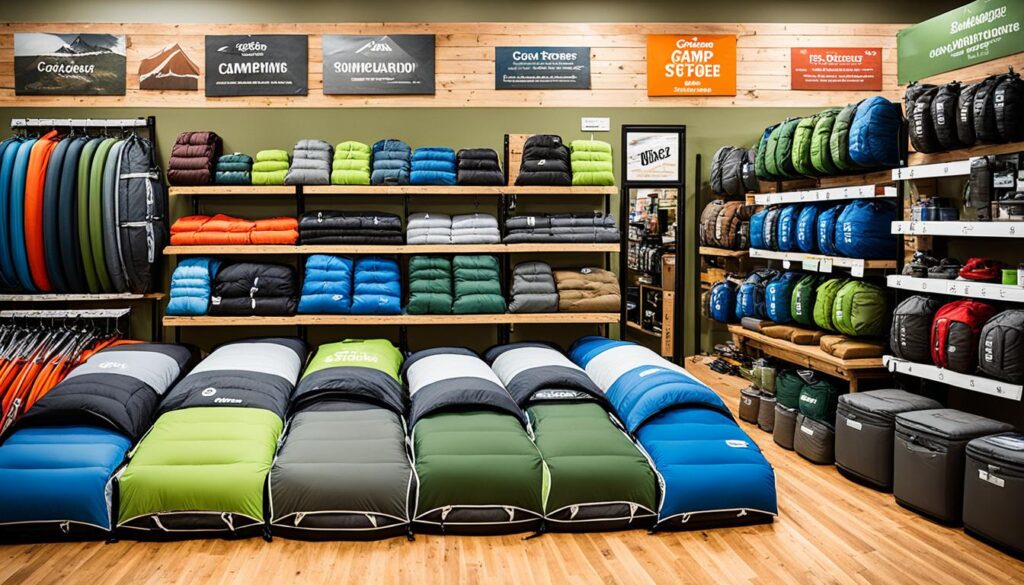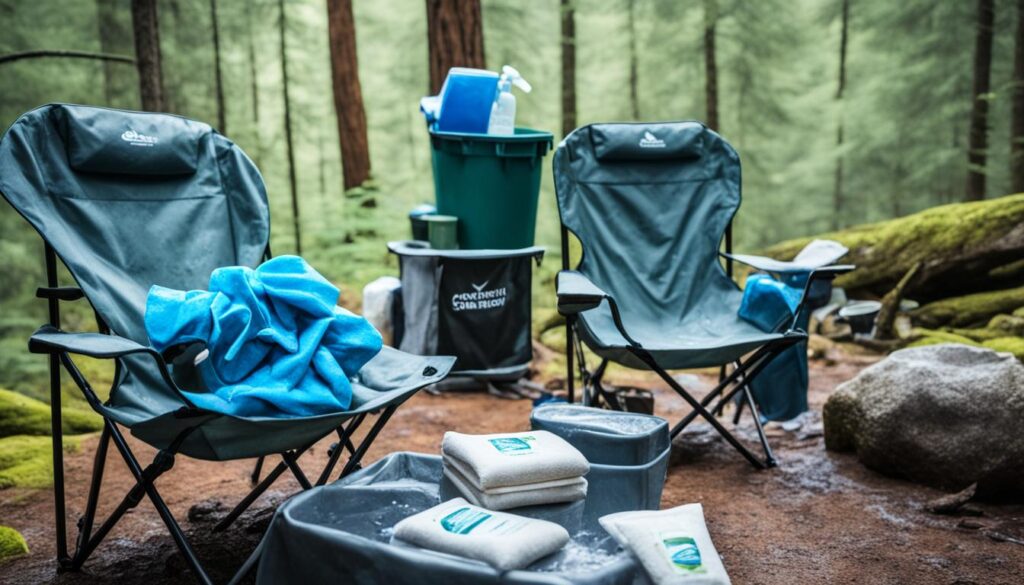Living in a campervan full-time has long held appeal to both young and old as it allows the freedom to travel all around the country for relatively low cost. However, before embarking on a full-time van life, it’s important to consider the various expenses involved. Understanding the costs associated with camping trips can help you plan your budget and ensure a smooth and enjoyable experience.
There are several key expenses to consider when calculating the cost of camping. These include the initial investment in a camper van, travel insurance and registration fees, fuel expenses, parking and camping fees, food and dining costs, vehicle maintenance and repairs, and the need for an emergency fund. By carefully considering each of these factors, you can better prepare yourself financially and avoid any unwelcome surprises along the way.
Key Takeaways:
- Calculating the cost of camping involves considering various expenses such as the initial investment in a camper van, travel insurance, fuel expenses, parking and camping fees, food costs, vehicle maintenance, and an emergency fund.
- Camper van prices can vary greatly depending on whether the van is new or used and whether it has been renovated.
- Travel insurance and registration fees are essential for ensuring your safety and compliance with state requirements.
- Fuel expenses can be significant, so it’s important to consider the fuel efficiency of your van and budget accordingly.
- Parking and camping fees can range from $10 to $50 per night, but free options can also be found with proper research.
Contents
The Cost of a Camper Van
When considering the cost of a camper van, there are a few factors to take into account. The price of a camper van can vary widely depending on whether it is new or used and whether it has already been renovated. For those looking to purchase a new rig with all the latest features, prices can reach upwards of $200,000 or more. On the other hand, older used models can be found for as low as $10,000.
For those on a budget:
If you’re looking to save money, buying a cheap but mechanically sound van and renovating it yourself can be a cost-effective option. This allows you to customize the van to your specific needs and preferences while keeping expenses in check.
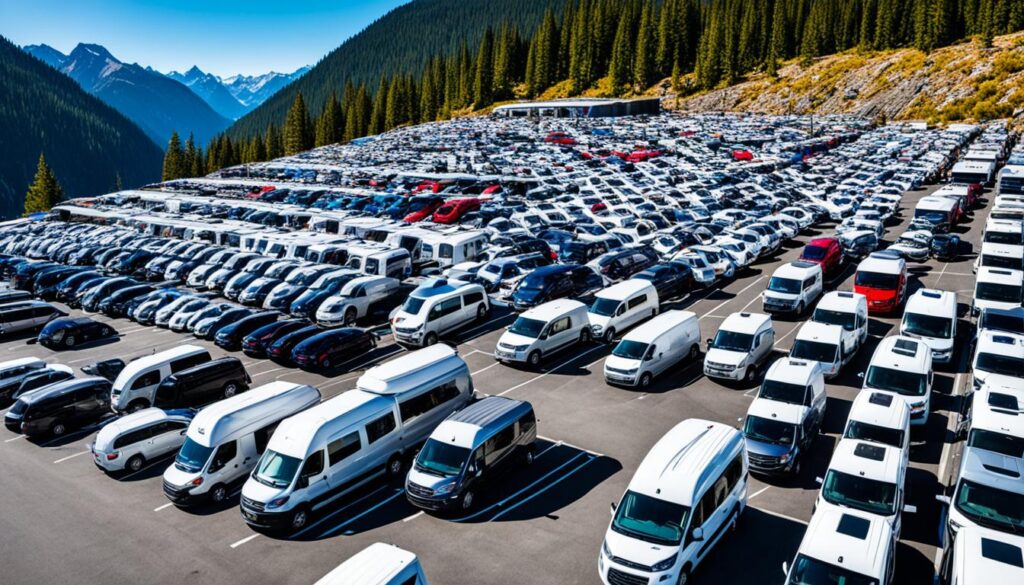
Insurance and Registration Fees
As a vehicle, a camping van or motorhome must be properly licensed, registered, and insured. In some states, the van may need to pass an emissions test. Insurance costs will vary depending on the state, driving record, and type of van. On average, full-time insurance for an RV or campervan can range from $1,000 to $2,000 per year. It is important to contact an insurance company for a quote and ensure the van is adequately insured.
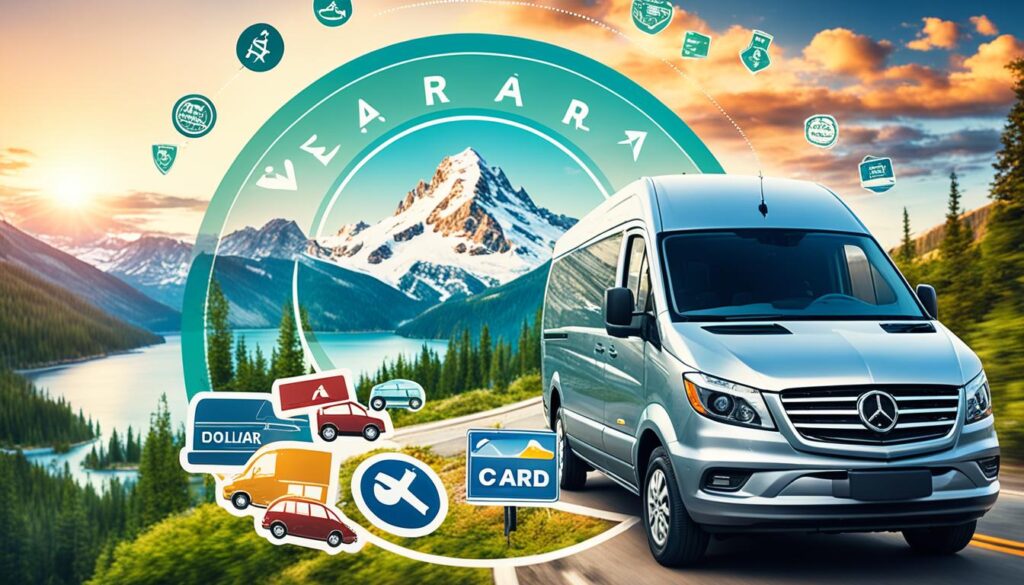
Registration Process and Fees
Registering a camping van varies by state, but it typically involves providing proof of ownership, identification, and payment of registration fees. These fees can range from $50 to $300, depending on the state and the weight of the vehicle.
Emissions Testing
In certain states, emissions testing is required for vehicles, including camping vans. This test determines if the vehicle meets the state’s environmental standards. The cost of emissions testing varies by state but is generally around $20 to $30.
Insurance Costs
The cost of insurance for a camping van depends on various factors, including the state, driving record, and type of van. In some cases, adding specialized coverage for equipment and personal belongings may increase the premium. It is advisable to reach out to insurance companies specializing in travel van insurance to obtain accurate quotes based on individual circumstances.
Here is a general overview of the average insurance costs for different types of vans:
Average Insurance Costs for Different Types of Vans
| Type of Van | Average Annual Insurance Cost |
|---|---|
| Class A Motorhome | $1,000 – $2,500 |
| Class B Campervan | $800 – $1,500 |
| Class C Motorhome | $1,200 – $2,000 |
| Converted Van | $800 – $1,500 |
Keep in mind that these are estimated costs and actual premiums may vary. It is always recommended to obtain quotes from multiple insurance providers to ensure the best coverage and rates.
Fuel Expenses
Fuel expenses can be a significant cost for full-time van life, especially if the van is not fuel-efficient. Older campervans typically get less than 20 mpg, while newer models may have slightly better gas mileage. To budget for fuel expenses, it is essential to consider the van’s gas mileage and plan accordingly.
When it comes to van fuel expenses, monitoring and optimizing gas mileage is crucial to keep costs under control. Here are a few tips to help you budget for fuel costs:
- Monitor your gas mileage: Keep track of how many miles per gallon your van gets. This will give you an idea of how far you can travel on a full tank.
- Plan your route efficiently: Optimize your travel routes to minimize the distance traveled. Use GPS or navigation apps to avoid unnecessary detours and traffic congestion.
- Consider fuel-efficient driving habits: Avoid aggressive acceleration and braking, maintain a consistent speed, and utilize cruise control when possible. These habits can help improve your gas mileage.
- Research gas prices: Before hitting the road, research gas prices along your route. Apps and websites like GasBuddy can help you find the most affordable fuel stations.
“By monitoring your gas mileage and implementing fuel-efficient driving habits, you can minimize your van fuel expenses and save money on the road.”
Remember to include fuel costs in your overall budgeting for van life. Calculate the estimated number of miles you’ll be driving and multiply it by your van’s gas mileage to get an idea of how much you’ll spend on fuel. This will help you allocate funds specifically for fuel expenses and avoid any surprises along the way.
Example Fuel Budget Calculation:
Let’s say your van gets an average of 15 mpg, and you plan to drive approximately 500 miles per month. Assuming the current gas price is $3 per gallon, you can calculate your monthly fuel expenses as follows:
| Monthly Mileage | Gas Mileage | Monthly Fuel Expenses |
|---|---|---|
| 500 miles | 15 mpg | $100 |
Keep in mind that gas prices fluctuate, so it’s essential to regularly check for updates and adjust your budget accordingly. By budgeting for fuel costs, you can plan your van life adventures without worrying about unexpectedly high fuel expenses.
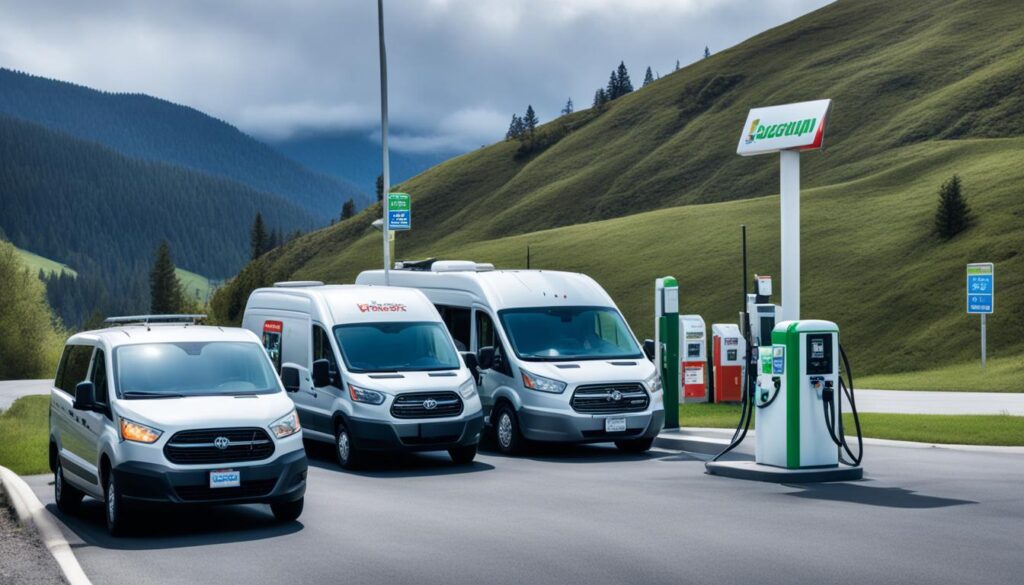
Parking and Camping Fees
When exploring the country in your campervan, one of the considerations you’ll need to factor into your budget is parking and camping fees. These costs can vary widely, ranging from as low as $10 to as high as $50 per night. Finding affordable options can make a significant difference in your overall expenses.
While some camping sites charge fees, it’s also possible to find free parking options for your campervan. Large parking lots, parks, and roadside pull-offs can provide no-cost or low-cost options for overnight stays. However, finding these free spaces requires some research and exploration, as they may not always be readily available in all areas.
It’s important to note that overnight parking restrictions may exist, particularly in larger cities. Be sure to familiarize yourself with local regulations and respect any limitations on overnight stays. This will help you avoid potential fines and disruptions, ensuring a smooth and hassle-free travel experience.
FAQ
How much does it cost to go camping?
The cost of a camping trip can vary depending on several factors such as the duration of the trip, the location, and the amenities you choose. On average, campers can expect to spend around $40 to $60 per night for a campsite, and additional costs may include equipment rental, food, and transportation.
What are the expenses involved in a camping trip?
Camping trip expenses can include camping fees, equipment prices, reservation fees, meal costs, and transportation expenses. It is important to budget for these expenses in order to have a successful and enjoyable camping trip.
How much does camping equipment cost?
The cost of camping equipment can vary depending on the brand, quality, and type of equipment you need. Basic camping gear such as a tent, sleeping bag, and camping stove can range from $100 to $500. Additional gear like camping chairs, coolers, and lanterns can add to the cost.
What are the camping site charges?
Camping site charges can vary depending on the location and amenities provided. Campground fees typically range from $10 to $50 per night, with additional charges for amenities such as electrical hookups or waterfront views.
How much do camping meals cost?
The cost of camping meals will depend on your food choices and the number of people you are feeding. On average, campers can expect to spend around $30 to $50 per day on groceries and other food items.
Do I need to pay reservation fees for camping?
Some campgrounds charge reservation fees when you book a campsite in advance. These fees typically range from $5 to $15 per reservation and are non-refundable.
How much do camping gear prices vary?
Camping gear prices can vary depending on the brand, quality, and type of gear you are looking for. Basic camping gear such as tents and sleeping bags can range from $100 to $500, while more specialized gear like camping stoves or backpacks can cost upwards of $100.
How much do camping accommodations cost?
Camping accommodations can vary greatly depending on the location and type of camping you choose. Campground fees typically range from $10 to $50 per night, while RV park fees can be higher, ranging from $30 to $100 per night.
